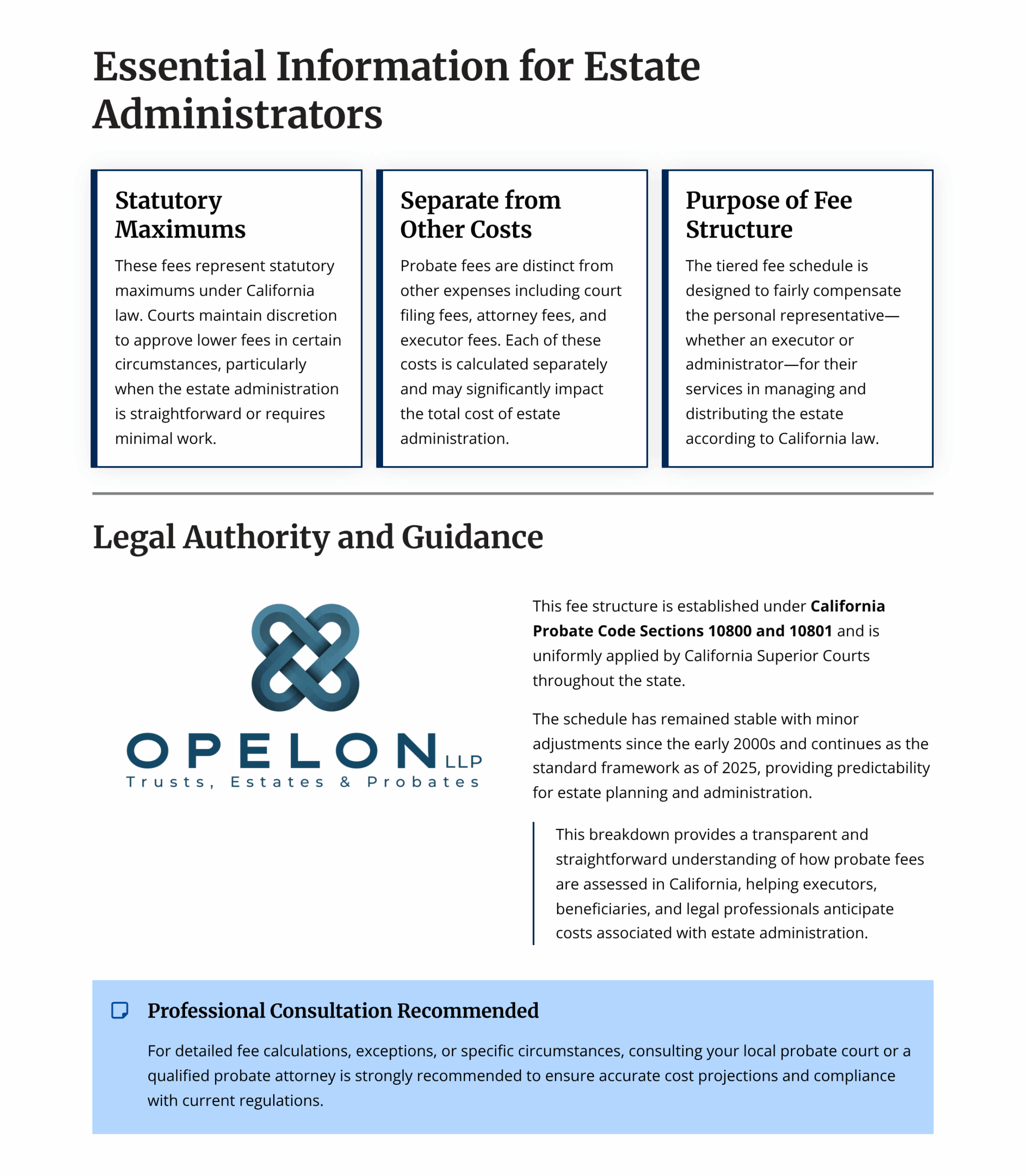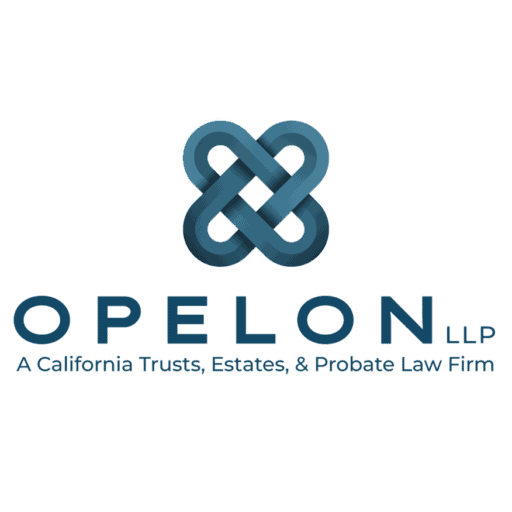Our Probate Services
Full-Service Probate Administration
From filing petitions to distributing assets, we manage every step of the probate process efficiently and in full compliance with California law.
We advise executors and trustees on their duties, ensuring they meet all deadlines and avoid costly mistakes during estate administration.
About Opelon LLP's Probate Lawyers
At Opelon LLP, our dedicated probate attorneys simplify the legal process after a loved one’s passing. With years of estate administration experience, we focus on timely resolutions and peace of mind for families. Our mission is to handle every detail with professionalism, transparency, and compassion.

Experienced Probate Attorneys
Transparent Communication
We keep you informed at every step, ensuring you always understand the status and next actions.
Efficient, No-Dispute Focus
Personalized Legal Support
See Review From Our Clients
About Opelon LLP's Probate Lawyers
At Opelon LLP, our dedicated probate attorneys simplify the legal process after a loved one’s passing. With years of estate administration experience, we focus on timely resolutions and peace of mind for families. Our mission is to handle every detail with professionalism, transparency, and compassion.

Need Help Finding a Probate Lawyer Near Me?
When you’re searching for a probate lawyer near me, it’s important to choose a firm that understands California’s probate process and can handle your case with care and efficiency. At Opelon LLP, our experienced probate attorneys help families throughout the state navigate estate administration, ensuring every detail is handled properly so you can focus on what matters most—your loved ones.
Working with a local probate lawyer means having a trusted guide who’s familiar with your county’s court procedures and requirements. Opelon LLP provides personalized legal support for executors, trustees, and families—helping you complete each step of the probate process efficiently and without unnecessary stress. Whether you need help filing documents, managing assets, or finalizing distributions, our team is here to make the process seamless from start to finish.
A probate lawyer assists by preparing and filing the initial petition for probate, serving statutory notices to heirs and creditors, establishing and supervising the inventory and appraisal process, and managing claims, taxes, and final distribution under court supervision. Attorneys coordinate with Probate Referees for appraisals, negotiate or litigate disputed creditor claims, and prepare accountings and petitions for discharge of the personal representative, reducing procedural errors that can prolong or complicate the probate timeline.
In contested matters, the lawyer evaluates litigation risk and pursues or defends claims such as undue influence or lack of capacity; in routine cases, they streamline administrative tasks to minimize fees and court appearances. For practical help, consider the firm’s probate offering—Probate legal representation and guidance for individuals navigating the probate process in San Diego County.
This includes assistance with estate administration, will validation, asset distribution, debt and tax management, and probate litigation—services that connect directly to petition preparation, inventory tracking, and creditor notice tasks handled by counsel.
How Much Does a Probate Lawyer Cost in San Diego?
Probate lawyer fees in California commonly follow the statutory fee schedule established by the California Probate Code, which bases attorney compensation on percentages of the gross estate value for ordinary services; additional case-specific costs (appraisals, publication, bond premiums) also apply.
Understanding the statutory percentages, examples of fee calculations, and typical extra fees helps clients estimate probable costs and identify ways counsel can minimize expenses through efficient administration.
The table below compares statutory attorney fee tiers, typical court and appraisal fees, and representative total cost ranges for different estate sizes to clarify expected financial exposure in San Diego probate cases. After the table, practical tips explain how attorneys can limit fees through simplified procedures and negotiated settlements.


Probate Lawyer FAQs
What Are Statutory Attorney Fees Under California Probate Code?
| Estate Component | Attribute | Typical Value / Range |
|---|---|---|
| Statutory attorney fees | Percentage tiers under Probate Code | Vary by estate size; examples given below for calculation |
| Court and filing fees | Filing, probate referee, publication | $200–$1,500 typical aggregate (varies by case complexity) |
| Appraisal and expert costs | Probate Referee, specialist appraisers | $500–$5,000+ depending on asset complexity |
California’s statutory fee schedule compensates attorneys for ordinary services using percentage tiers applied to the gross value of the probate estate, often with common tiers such as 4% of the first $100,000, 3% of the next $100,000, 2% of the next $800,000, and smaller percentages on larger values, though attorneys may petition for different amounts based on extraordinary services.
Example calculations show that for a $500,000 gross estate, these percentages produce a predictable fee baseline, but courts can adjust fees upward or downward for complexity, time spent, or value added by counsel.
Knowing how these percentages apply helps executors estimate likely attorney compensation and weigh simplified procedures or small estate options where statutory fees may be minimized. When accountability or complex litigation is present, attorneys may bill additional hourly or extraordinary fees subject to court approval.
How Can a Probate Lawyer Help Minimize Probate Expenses?
Working with the best probate attorney will help minimize expenses by using simplified procedures for eligible estates, timely communicating with creditors to limit claims, preparing complete filings to avoid rework, and recommending probate avoidance tools where appropriate.
Probate attorneys also negotiate settlements, use mediation to resolve disputes, and coordinate tax planning to reduce liabilities.
Practical tactics include determining small estate affidavit eligibility, employing summary or limited administration for certain asset types, and avoiding unnecessary litigation through early dispute resolution.
These strategies both reduce billable hours and preserve estate value, creating measurable savings for beneficiaries and smoother administration for personal representatives. The next section explains standard probate avoidance methods that counsel commonly recommend.
How Can a Probate Lawyer Help You Avoid Probate in San Diego?
Yes, in many cases, a probate lawyer can help avoid probate through estate planning techniques and post-death transfer mechanisms that keep assets out of probate.
However, suitability depends on asset types, family circumstances, and estate size.
Effective probate avoidance strategies include establishing revocable living trusts, using joint tenancy or tenancy-in-common where appropriate, maintaining beneficiary designations on retirement accounts and transfer-on-death or payable-on-death designations, and considering lifetime gifting.
A lawyer evaluates the advantages and drawbacks of each approach, drafts the necessary instruments, and coordinates the retitling of assets to ensure intended outcomes, balancing privacy, cost, and control.
The table below compares standard options, their key characteristics, and the benefits and drawbacks to help you choose the right approach for your situation.
This comparison clarifies practical trade-offs; the next subsections outline the most common avoidance strategies in detail.| Approach | Characteristic | Benefit / Drawback |
|---|---|---|
| Revocable living trust | Avoids probate for trust assets | Benefit: privacy and faster transfer; Drawback: requires funding and maintenance. |
| Joint tenancy | Title passes by right of survivorship | Benefit: simple transfer for co-owned assets; Drawback: may create tax or control issues |
| Beneficiary designations (TOD/POD) | Direct transfer to named beneficiaries | Benefit: quick transfer for financial accounts; Drawback: requires upkeep of designations |
| Small estate affidavit | Simplified transfer for qualifying estates | Benefit: low-cost probate avoidance; Drawback: strict thresholds and limitations |
How expert counsel integrates local knowledge, procedural discipline, and dispute-avoidance tactics is the final practical consideration for anyone managing an estate in San Diego, and engaging a qualified probate attorney early preserves options and reduces downstream risk.How a Probate Lawyer Helps You Navigate the Probate Process Efficiently
What Role Does a Probate Lawyer Play in Will Validation and Contests?
Probate counsel proves a will’s validity by submitting the original will, securing witness testimony or affidavits, and addressing procedural objections that might undermine probate. When challenges arise, claims of undue influence, lack of capacity, or forgery, an attorney evaluates evidence, pursues mediation where appropriate, or files responsive pleadings to protect the estate’s interests.
The lawyer’s role is both defensive and investigative: preserving estate assets while pursuing negotiated resolutions to avoid costly litigation. Effective early counsel often prevents contests from escalating, which leads into how counsel manages debts and distributions.
How Can a Probate Lawyer Help Manage Debts and Asset Distribution?
Probate attorneys notify creditors, evaluate claims for validity, prioritize payments under statute, and recommend practical strategies for partial distributions that protect executors from liability.
The mechanism includes publishing notice where required, setting claim deadlines, and obtaining court approval for disputed claim settlements to prevent later challenges. By sequencing creditor payments and distributions, counsel maximizes the net value for beneficiaries and provides transparent accounting to the probate court. This creditor-management approach also reduces the likelihood of beneficiary disputes, moving naturally toward litigation and dispute-resolution services when disagreements persist.
The probate court provides oversight at key junctions—approving appointment of the executor, authorizing sales or transfers, validating accountings, and resolving contested matters—to ensure legal fairness. Judges review petitions and accountings, evaluate fee reasonableness, and issue orders that give executors authority to act; counsel presents required documentation and advocates for efficient resolutions. Where disputes arise, court hearings establish factual records and rulings that bind parties, making timely legal representation essential. Understanding court touchpoints helps executors anticipate when filings and approvals will be necessary.
What Are Common Probate Lawyer Fee Structures?
Who Is Responsible for Paying Probate Attorney Fees?
How Can You Estimate Total Probate Costs?
Why Choose Opelon LLP for Your Probate Legal Needs?
How Does Opelon LLP Provide Expert and Compassionate Probate Guidance?
What Makes Opelon LLP Efficient in Navigating Complex Probate Cases?
Efficiency stems from using standardized workflows, coordinated teams, and strategic engagement of appraisers and tax advisors to compress valuation and tax-preparation timelines.
Opelon LLP prioritizes early documentation, pre-filing checklists, and proactive creditor management to limit court appearances and accelerate distributions. The result is a streamlined administration that reduces estate expenses and shortens time to distribution when possible. These operational efficiencies are particularly valuable for estates with diverse assets or cross-jurisdictional issues.
What Do Clients Say About Opelon LLP’s Probate Services?
Opelon LLP’s probate practice focuses on delivering practical results and reducing client burden through clear plans and steady guidance during administration.
Client outcomes emphasize timely filings, structured communications, and effective coordination with third-party experts to resolve valuation and tax issues. Prospective clients are encouraged to consult directly to discuss their estate specifics and to determine how Opelon LLP’s approach aligns with their priorities for efficient administration. Direct conversations with counsel also identify the appropriate fee model and anticipated timeline.
How Can a Probate Lawyer Help Minimize Inheritance Tax and Financial Burdens?
Probate attorneys advise on tax obligations and alternative strategies that can reduce estate exposure to inheritance or estate taxes and limit probate-related costs. The mechanism includes coordinating with tax advisors to apply deductions, elections, and timing strategies; recommending estate planning vehicles such as trusts where appropriate; and evaluating transfer-on-death or joint-ownership options to bypass probate when beneficial.
The primary advantage is preserving estate value for beneficiaries while ensuring compliance with federal and state tax rules. The table below summarizes common tax and probate-avoidance strategies and their potential benefits.
| Strategy | Application | Potential Benefit / Example |
|---|---|---|
| Revocable Trust | Transfer assets into trust before death | Bypasses probate for trust assets; speeds transfer |
| Transfer-on-Death Designation | Name beneficiaries on accounts/title | Avoids probate for designated assets |
| Small-Estate Affidavit | Use statutory simplified process | Reduces paperwork and cost for qualifying estates |
How Can Probate Lawyers Assist with Tax Planning and Reduction?
Probate counsel works with accountants to identify deductions, credits, and timing strategies—such as filing final income returns, claiming allowable administrative expenses, or making estate tax elections—that reduce tax burdens.
Lawyers also advise on structuring distributions or using trusts to shift tax exposure strategically while maintaining legal compliance. Collaboration with tax professionals ensures that legal filings align with optimal tax outcomes and that tax risk is minimized before assets are transferred. Integrated tax planning protects beneficiaries and gives executors a defensible roadmap.
How Do Executors and Beneficiaries Benefit from Probate Lawyer Support?
Executors and beneficiaries derive legal protection, clarity, and operational efficiency from probate counsel, which reduces personal liability for executors and enforces beneficiary rights when distributions or valuations are disputed.
The lawyer’s role includes translating fiduciary duties into concrete tasks, defending or asserting rights through court when necessary, and coordinating with specialists for complex assets. The following list highlights primary benefits that counsel provides to these key parties.
- Legal Compliance: Ensures filings, notices, and accountings meet statutory requirements.
- Liability Protection: Advises executors on steps that reduce personal exposure to claims.
- Efficient Distribution: Coordinates valuations and approvals to expedite transfers.
- Dispute Resolution: Defends beneficiary rights and negotiates contested matters.
Executors must collect and secure assets, provide notices, inventory and value estate items, pay valid debts and taxes, account to the court, and distribute assets per the will or intestacy rules.
A probate lawyer provides checklists, drafts required filings, and advises on fiduciary decisions such as asset sales vs. retention, bonding, and timing of distributions to protect the executor. This legal guidance lowers the risk of mistakes that could result in personal liability and makes the executor role manageable and compliant. Assisting executors in these duties naturally supports beneficiary protections.
The comprehensive services of an estate lawyer in managing estates include advising the executor, preparing and filing all necessary legal documents, and representing the estate in any court proceedings, ensuring accurate and efficient probate administration.
How Does a Probate Lawyer Protect Beneficiary Rights?
Attorneys ensure beneficiaries receive proper notice, accurate valuations, and fair distributions, and they can file objections or petitions when beneficiaries suspect misconduct or improper accounting. The mechanism includes reviewing proposals for distribution, evaluating appraisals, and advocating for court oversight when necessary to enforce rights.
Beneficiaries benefit from clear explanations of their options and legal remedies, which preserves entitlements and deters improper actions by fiduciaries. Protecting beneficiary rights often prevents disputes that would otherwise deplete estate value.
What Guidance Is Available for Executors Managing Complex Estates?
For estates with businesses, out-of-state property, trusts, or significant tax exposure, probate lawyers coordinate specialist input—appraisers, tax counsel, business valuators—and design phased administration plans to address each complexity efficiently.
Your probate attorney will recommend whether assets should be sold, held, or transferred in-kind, draft tailored petitions for multi-jurisdictional probate when needed, and sequence tax filings to minimize penalties.
This specialist collaboration reduces administrative risk and expedites resolution for complex estates. Effective coordination enables executors to navigate intricacy with confidence and legal compliance. How a Probate Lawyer Helps You Navigate the Probate Process Efficiently.
If you need guidance from an experienced probate lawyer in San Diego County, Opelon LLP is ready to assist. Our probate attorneys work with families throughout Poway, Mira Mesa, Encinitas, San Marcos, Vista, El Cajon, Escondido, and Oceanside, helping them navigate the California probate process with clarity and care.
From straightforward probate matters to more complex estate issues, our Carlsbad-based legal team is committed to providing practical legal solutions tailored to your situation. Contact Opelon LLP today to speak with a trusted probate lawyer and take the next step with confidence.




